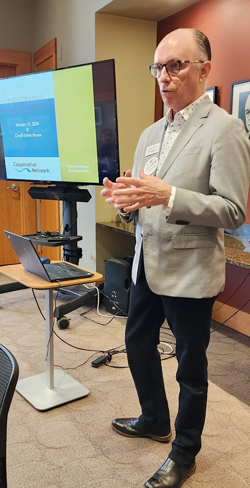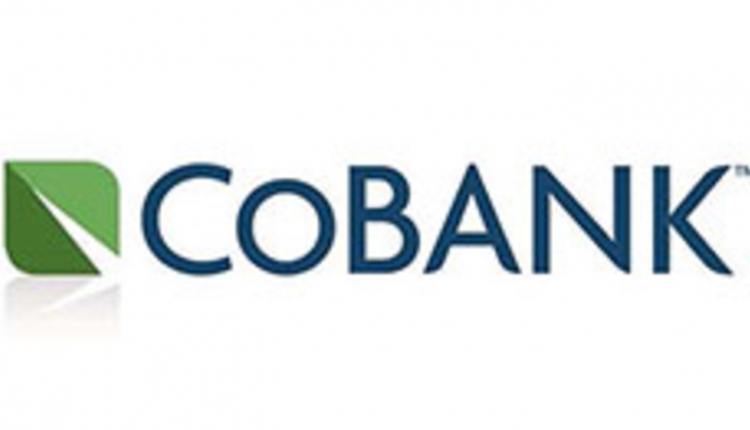The information below has been supplied by dairy marketers and other industry organizations. It has not been edited, verified or endorsed by Hoard’s Dairyman.

They’re big and small. Some consist of a handful of members and others represent tens of thousands.
They’re cooperatives, and in Minnesota and Wisconsin – where nearly 2,000 cooperatives across both states make up the largest concentration of co-ops in the nation ¬– they’re interests are represented by Cooperative Network (CN).
Known as The Trusted Voice for Cooperatives and structured as a cooperative, CN provides its member-cooperatives with a broad range of services, including business development, world-class legislative and regulatory advocacy, and creative leadership in public awareness.
Marking its 15th anniversary this year, the organization has launched numerous new programs and initiatives over the last few years and, coinciding with a membership campaign in April, is in the process of rolling out more.
So, just what is a cooperative?
A cooperative is a business voluntarily owned and controlled by its member-patrons and operated on a non-profit basis. Each cooperative member has an equal voice in the affairs of the cooperative, and profits earned by co-ops are returned directly to member-owners as patronage dividends or reinvested in business operations. Either way, the money finds its way back into local and regional economies, supporting businesses and creating jobs beyond the cooperative itself.
They follow a prescribed set of business practices:
- They provide an economic benefit for their members by returning surplus revenues proportionate to each member’s patronage;
- They are democratic organizations controlled by members, not outside investors;
- They are autonomous and independent;
- They recognize the importance of education about cooperative business and organizational practices;
- They are motivated not by profit, but by service and meeting members’ needs; and
- They practice concern for their communities, offering scholarships and youth education programs, and channeling loans and grants to needed local economic development activities.
The Rochdale Pioneers and the Seven Cooperative Principles
The cooperative movement dates to the 1840s when a group of weavers from Rochdale, England who’d been facing poor working conditions and unfair wages established the Rochdale Equitable Pioneers Society. The Pioneers are credited with developing standard principles of success for cooperatives throughout the world. Those principles, which have been refined, adapted and reinterpreted over time, are today known as the Seven Cooperative Principles: Voluntary and Open Membership; Democratic Member Control; Member Economic Participation; Autonomy and Independence; Education, Training and Information; Cooperation Among Cooperatives; and, Concern for Community.
At home, the Minnesota Association of Cooperatives was founded in 1945 to advance public perception of the cooperative movement, while the Wisconsin Federation of Cooperatives was formed in 1969 by two politically divergent organizations, the Wisconsin Association of Cooperatives, which primarily served consumer co-ops, and the Wisconsin Council of Agricultural Cooperatives.
The Minnesota association entered into a management agreement with its Wisconsin counterpart in 1998. The two organizations became one in 2004 after members voted in favor of formal unification; the merged organization was renamed Cooperative Network in 2009.
About Cooperative Network
Cooperatives have long been a part of the self-help tradition of America, and CN is dedicated to maintaining its role as the primary vehicle for cooperatives of all sectors to collaborate on issues of significance to the cooperative form of business. This support includes daily representation of cooperative interests in both state capitols, and through affiliation with national and federal organizations.
Governed by a board of directors made up of cooperative leaders from Minnesota and Wisconsin, CN members help identify the organization’s legislative and educational priorities, as well as assist with developing and guiding sector strategies.
“It’s often said the only constant is change, and that applies to Cooperative Network as well,” said Daniel Smith, CN president and CEO. “With the onset of the pandemic, we, like most organizations, saw a major drop in our number of in-person meetings, presentations and speaking engagements, but we pivoted and added more on-line workshops and virtual events and resources, including a new six-part video series for cooperative board directors and staff on topics of importance, such as best governance practices, talent recruitment, and understanding cooperative finances. We also launched a new bi-annual magazine called Cooperative Focus, which has been very well received.”
The magazine includes news and feature articles on projects and accomplishments of member cooperatives, legislative updates, news of upcoming events, historical articles, and articles of interest about the larger cooperative community.
“A key common denominator for the work we do is communication,” said Smith. “It’s essential that policy makers, business leaders, and the public are aware of the economic, social, and cultural impacts of cooperatives. Towards that end, Cooperative Network maintains a robust and multi-faceted communication platform which includes our website, a bi-monthly legislative newsletter, a monthly membership newsletter, media interviews, press releases, blogs and social media posts, and now our new magazine.”
‘Opening doors and finding solutions’
In critical times, CN opens doors and finds solutions. Just ask Robert Cornell, general manager of CN member Washington Island Electric Cooperative. “We suffered catastrophic equipment damage that required immediate replacement,” said Cornell. “Cooperative Network’s influence with those in state government got us in the door to present our request for disaster assistance, expediated the process, and resulted in rapid approval of much-needed funds.”
Sadie Frericks, Minnesota dairy farmer, Land O’ Lakes member, and current chair of the CN board of directors, said, “Cooperatives need to support each other. We provide essential goods and services to the communities we serve. No cooperative operates in a vacuum. Cooperation amongst cooperatives is the founding principle of Cooperative Network. Now, as much as ever, we need to work together to protect and promote the cooperative business model.”
Added Dr. Mark Huth, president and CEO of Group Health Cooperative of South-Central Wisconsin, “Cooperatives working together help form engaged communities. As a health care cooperative dedicated to the well-being of our patients, and our communities, we rely on Cooperative Network to help us build for a successful tomorrow.”
Cooperative Network membership benefits

“The benefits of Cooperative Network’s daily presence in the Minnesota and Wisconsin state capitols are evident in our track record of legislative accomplishments, earned through countless hours of attending committee meetings, public hearings, and conversations with policy makers,” said Smith. “In recent legislative cycles, for instance, we worked with our state legislatures to establish grant programs to help finance new cooperatives and expand existing co-ops, expand farm service CDLs, advocate for historic investments in broadband infrastructure funding, and provide more support for agriculture industry programs, as well as state and federal exporting initiatives. Cooperative Network makes certain the voice of cooperatives is heard when important decisions are being made.”
Membership in the organization provides many benefits, including access to a stock photography collection of nearly 2,000 professional royalty-free photos for use in marketing, communications and advertising projects. Two electronic newsletters – Co-op Connection and Capitol Connection – provide members with up-to-date information on member services and news.
Throughout the year, CN hosts numerous on-line webinars and forums on state and national issues of importance to cooperatives, including an annual Cooperative Communicators Workshop designed to improve member cooperatives’ marketing and communications skills.
Members also have free access to graphics, logos and other materials to help celebrate National Co-op Month, held annually in October. Members can post job openings on CN’s Co-op Careers page, and they also have access to many other resources including a ‘Co-ops are Everywhere’ animated video and a coloring book.
In March, CN teamed for the first time with the National Cooperative Business Association CLUSA International to present the 2024 Cooperative Legislative Forum, a virtual discussion of federal and state issues important to cooperatives of all sectors and sizes.
CN is currently working on series of monthly webinars on a variety of topics, including co-op credit issues, director recruitment and onboarding strategies, cooperative insurance, and cooperative mergers and acquisitions. Plans are also in the works to develop a new Cooperative College, a series of virtual classes on cooperative governance, finance, succession planning and strategy, and other topics.
Funded primarily through dues paid by member cooperatives, CN is launching a membership campaign in April.
“Cooperative Network’s accomplishments benefit all cooperatives, yet only a fraction of cooperatives contribute financially to help the organization continue its work,” said Smith. “We believe this needs to change. We also believe membership in Cooperative Network provides an excellent return on a cooperative’s investment. In coming weeks and months, we’ll be reaching out to non-members to respectfully ask they join Cooperative Network.”
Said Smith, “Our passion is advocacy, education and awareness, and our goal is to continue to provide and update resources that will enhance this business model for future success. Every program we administer, every experience we provide, is designed to provide our members with top-notch service.”
(Cooperative Network – The Trusted Voice for Cooperatives – is committed to protecting and promoting Wisconsin and Minnesota cooperative businesses and their shared cooperative principles by providing legislative advocacy, education, public awareness, and development services. Cooperatives interested in joining Cooperative Network can contact Daniel Smith at Dan@cooperativenetwork.coop. Visit cooperativenetwork.coop or follow us on Facebook, Twitter, LinkedIn or YouTube for more information.)


